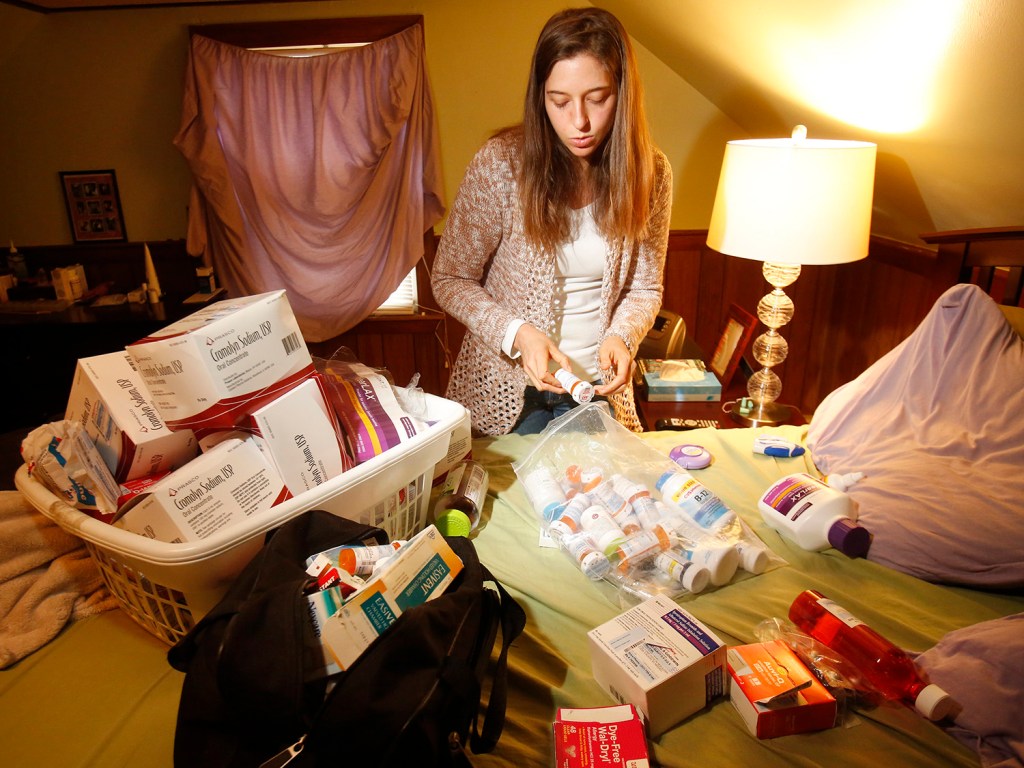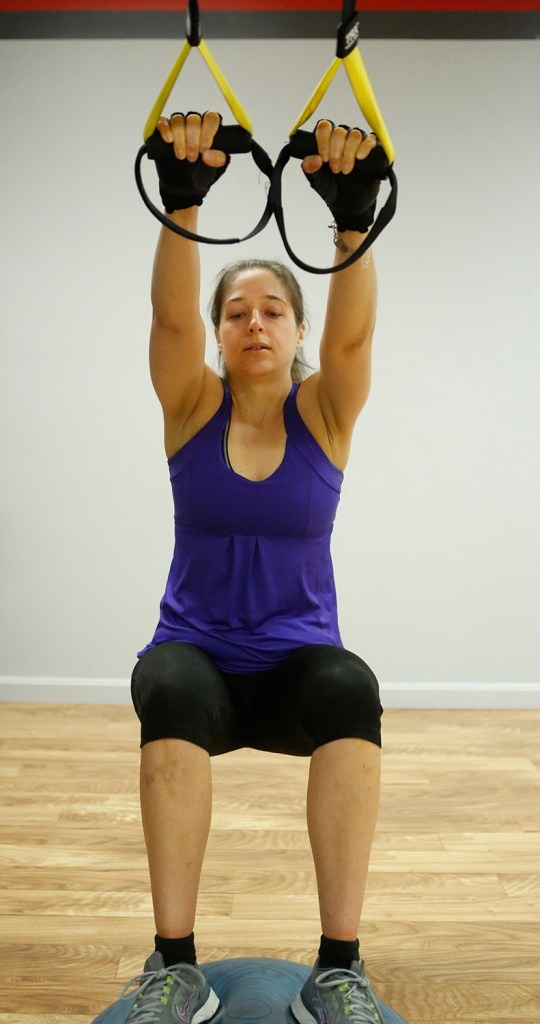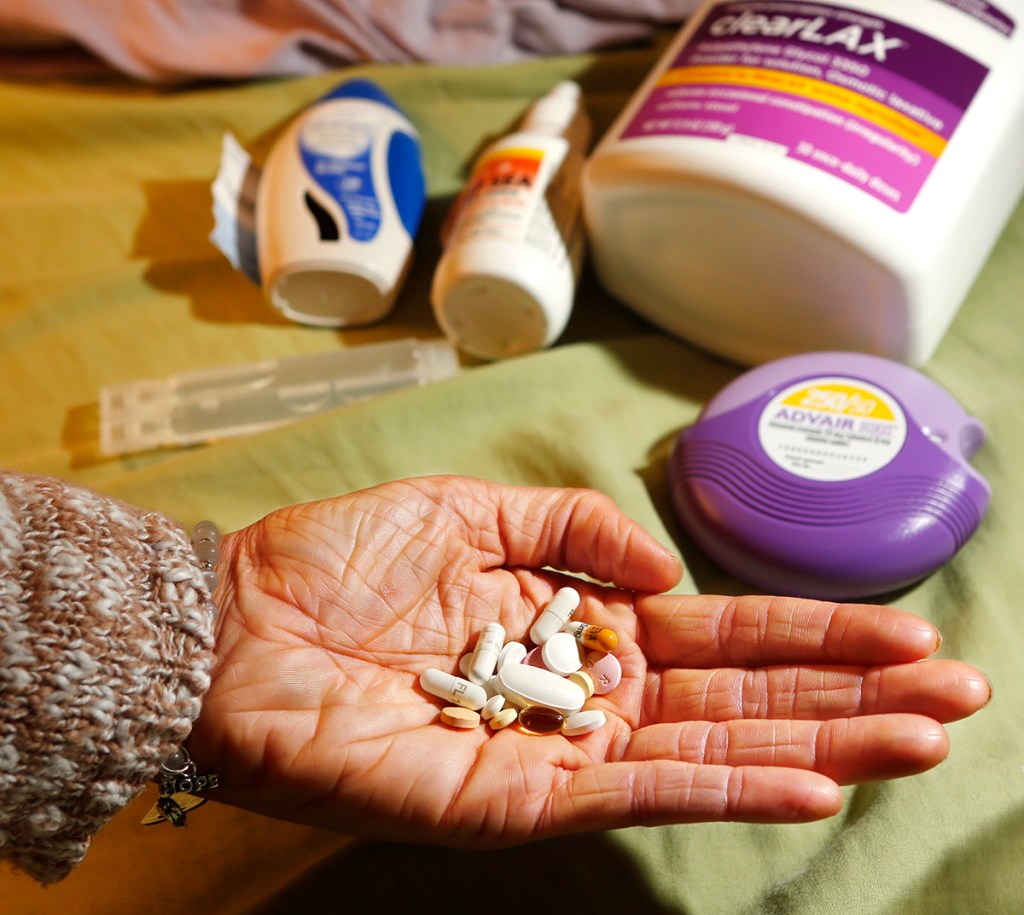Crystal Goodwin swallows a fistful of pills four times per day to treat mast cell activation syndrome, a rare immune system disease that has hospitalized her more than 30 times since 2011 with life-threatening allergic reactions.
If that weren’t difficult enough, the 30-year-old from South Portland also has to battle financial challenges.
She’s stuck in a bureaucratic quagmire, falling into a loophole between the Affordable Care Act and Medicare. The predicament threatens to bury her in debt while she fights for her life.
“She’s fallen into this very unusual hole,” said Dr. Marguerite Pennoyer, a Scarborough immunologist who is Goodwin’s physician.
Goodwin can’t afford to accept Medicare because she takes numerous expensive, specialized medications that are either not covered or only partially covered by Medicare’s prescription drug program. Because she’s refusing Medicare, she’s forbidden from obtaining subsidies on the Affordable Care Act’s health insurance marketplace for which she would otherwise qualify.
Both the marketplace and Medicare are designed for those like Goodwin – low- to medium-income people who are ill and need insurance to help pay for their health care. Instead, Goodwin’s health care costs will eat up – at a minimum – more than half of her annual $20,000 disability income. Faced with no other choice, she’s using unsubsidized ACA marketplace insurance.
“It’s like I’m in this doughnut hole,” Goodwin said. “Nothing I do fits either program.”
EXPENSIVE COVERAGE OPTIONS
Health care experts say the case is puzzling, and there do not appear to be any immediate answers for Goodwin.
A few months’ worth of the pills, inhalers, liquid medicine and other treatments she needs filled up a laundry basket and about half of her bed when she showed them to the Press Herald recently. Those medications cost money, and she has no idea how she’s going to pay her share of the price.
She’s facing more than $10,000 in medical bills over the next three months, nearly half of her annual income. She needs the medications to live, and said she will soon start relying on credit card debt to avoid weekly trips to the hospital, or death. Goodwin has no way of paying the bills – she can’t work because of her disability and can’t obtain insurance that alleviates the costs.
She qualifies for Medicare and its prescription plan, but because her medications are so numerous and specialized, her co-pays and other shared costs would be more than $3,000 per month, according to documents she provided to the Press Herald. The $3,000 per month is only part of her costs, because while Medicare will help pay for about half of the 35 prescriptions she needs, it won’t pay any costs for the other half, according to the documents.
“We totaled everything up, and it came to more than $100,000 per year,” said Goodwin, who was a children’s mental-health worker before she qualified for disability insurance.
When Medicare notified her in October that she qualified, she was originally “super excited.” But when a letter detailed the prohibitive costs of her specialized medication, Goodwin had to decline the government program’s prescription and insurance plans while maintaining Medicare’s free hospitalization services.
Goodwin had been receiving subsidized ACA marketplace coverage this year. Her premium was $120 per month, with a $1,500 out-of-pocket maximum.
But when she had to turn down Medicare in October, the ACA took her subsidies away, as required by law. Her premium skyrocketed to $270 per month, and on top of that she has to pay a $4,500 out-of-pocket maximum. She also pays about $200 per month for over-the-counter drugs that no insurance covers.
Annually, her total health care costs went from about $5,300 per year to $10,200 per year.
To add to her costs, when the ACA subsidized plan was canceled this fall, her unsubsidized plan was counted as new coverage, meaning she will have to immediately pay a $4,500 deductible and another one in January. Her prescription costs are so high that she meets her deductible almost immediately after insurance starts.
“I don’t pretend to understand this,” said Pennoyer, Goodwin’s physician. “Typically, Medicare would cover these costs.”
Goodwin has reached out to U.S. Sen. Angus King’s office for help, and King’s office is in the early stages of trying to untangle the bureaucracy.
“We have connected (Goodwin) with several organizations and resources, and we have also been in touch with the Centers for Medicare and Medicaid Services on her behalf,” King spokesman Scott Ogden wrote in an email. “Senator King believes that every American, regardless of circumstance, deserves high-quality, affordable health insurance.”
Centers for Medicare and Medicaid Services spokeswoman Courtney Jenkins said the agency could not comment on individual cases.
Emily Brostek, president of Consumers for Affordable Health Care, which also is helping Goodwin, said there is “not a lot of flexibility” in the health insurance marketplace to provide subsidies for someone who declines Medicare because it’s too expensive. In rare circumstances, such as a patient who needs specialized, expensive medication like Goodwin does, Medicare would be unaffordable, she said.
“In a few cases, it’s possible that the health insurance marketplace would provide better coverage than Medicare,” said Brostek, who does not believe the current system allows for many exceptions.
SUDDEN ONSET OF MANY ALLERGIES
Goodwin was a healthy 26-year-old when she was hospitalized at Maine Medical Center one day in September 2011 for severe allergies, probably because of an unknown environmental trigger.
After recovering, she kept suffering from sometimes life-threatening allergic reactions, and ended up in the hospital on average once every two weeks. Her allergic reactions range from hives to rashes to breathing difficulties to her lungs filling with fluid. She spent about a year visiting allergy specialists before being diagnosed in 2012 with mast cell activation syndrome, which has no known cure.
Goodwin’s allergies include latex, cigarette smoke, nuts, perfumes, household cleaners, gluten, processed food, shellfish, dust, lotions, pollen, sunlight and adhesives.
“If you took out some duct tape right now, I would probably have to go to the hospital,” Goodwin said. “My whole body turns red and itchy, and I can feel my lungs filling with fluid.”
Her condition has made it so that she can’t work or do normal activities, such as go to movies or concerts or be around groups of friends. She has to avoid being near people who might unwittingly do something that could cause an allergic reaction.
Treatment has reduced her hospitalizations from once every two weeks or so to about once every six weeks, but she still has to be very careful about where she goes.
It’s an isolating life, Goodwin said.
One of the few places she can visit without fear is Snap Fitness in South Portland, which uses only unscented cleaners and is careful to keep potential allergens out of the 24-hour fitness facility.
“I treat it like my job,” Goodwin said. “I go here and work out for about an hour, socialize and go home. That’s about all that I have energy for. I’m wiped out the rest of the day.”
Still, the fitness center has improved Goodwin’s health, from being unable to do one push-up, to cranking out 25 push-ups at one time in addition to cardiovascular and weight training.
Darren Smith, a personal trainer at Snap Fitness who has become her friend, said Goodwin has become an inspiration to the staff and patrons at the fitness center.
“People are rallying behind her. Why wouldn’t we help her?” said Smith, who is coordinating a fundraising campaign to help pay Goodwin’s medical bills.
FEARFUL, RESILIENT, A FIGHTER
Despite some improvements, Goodwin said her condition requires constant monitoring, and she lives in fear that she might die from one of the allergic reactions. Every time she’s hospitalized, it takes her weeks to physically and mentally recover.
“It’s like every time I climb up this hill and I’m partway up the hill, then this boulder comes down and I’m struck down,” Goodwin said. “There’s still this grieving. I lost the life that I had. I’m always measuring how close I am to Maine Med, because I can’t be too far away.”
Her mother, Susan Goodwin, said Crystal is resilient and fights for her rights, medically and financially.
“I can’t believe we don’t have a better system in place to help her,” Susan Goodwin said, as her daughter made homemade applesauce, one of the few snacks she can eat. “She gets up every day with a smile on her face, doing what she has to do to be alive.”
Crystal Goodwin, who has saucer-shaped eyes and flashes a broad smile even when talking about difficult topics, said she’s so immersed in her problems that she can’t think about the future. She said finding a husband and having children, the life stages that her friends are going through, seem remote.
“I would be too much of a burden,” Goodwin said. “I don’t know minute to minute how long I am going to live.”
Goodwin said her immediate goal now is to keep from going into debilitating debt.
“It’s a full-time job just to stay alive,” she said. “I am trying to be the healthiest sick person I can possibly be.”
Send questions/comments to the editors.









Success. Please wait for the page to reload. If the page does not reload within 5 seconds, please refresh the page.
Enter your email and password to access comments.
Hi, to comment on stories you must . This profile is in addition to your subscription and website login.
Already have a commenting profile? .
Invalid username/password.
Please check your email to confirm and complete your registration.
Only subscribers are eligible to post comments. Please subscribe or login first for digital access. Here’s why.
Use the form below to reset your password. When you've submitted your account email, we will send an email with a reset code.